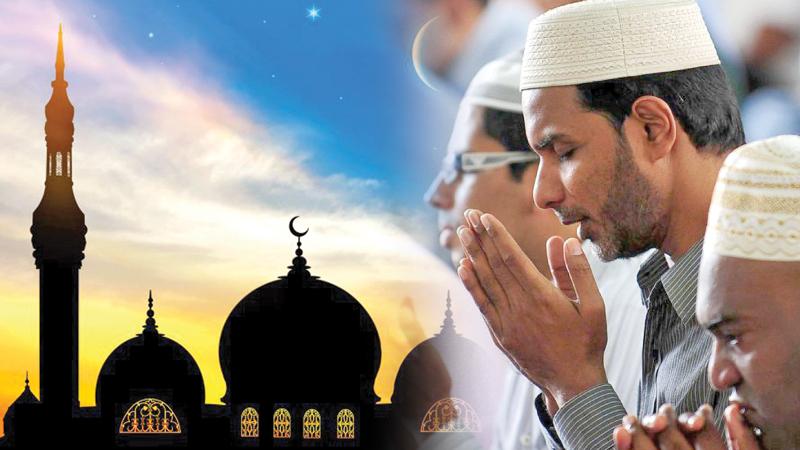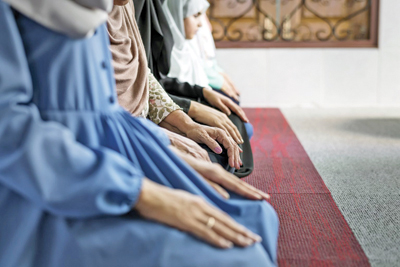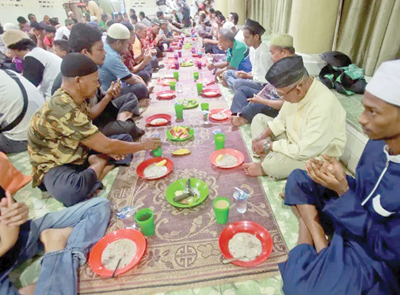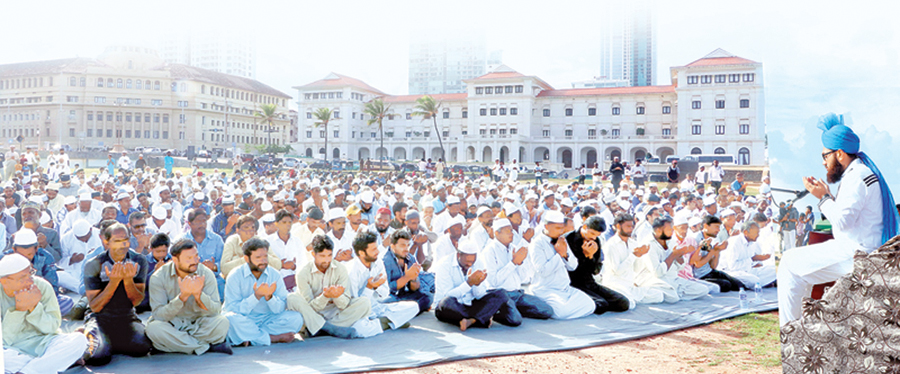
Muslims across the world were fasting from March 23 when the New Moon was sighted. This weekend, Muslims across the world celebrate Eid-ul-fitr, which marks the end of fasting and a new beginning in their lives. Ramadan is a Holy Month of fasting; introspection and prayer for Muslims, the followers of Islam.
Muslims believe the month of Ramadan is the holiest month which teaches about all aspects of spiritual purification. Ramadan is the ninth month in the Islamic lunar calendar. Every year, Muslims around the world fast during daylight hours – from dawn until dusk abstaining from drinking, eating, immoral acts and anger. Fasting (Sawm) is one of the Five Pillars of Islam, which forms the basis of how Muslims live their lives. The other Pillars are Faith (Shahada), Prayer (Salat), Charity (Zakat) and the pilgrimage to Makkah (Hajj), which each Muslim should undertake at least once in his or her lifetime.
During the Holy Month of Ramadan, Muslims wake up early in the morning before the ‘Fajr’ morning prayer to have a pre-dawn meal called ‘Suhoor’ and they end fasting for the day with a meal referred to as ‘Iftar’ after the sunset. Fasting in the month of Ramadan is mandatory for all healthy adult Muslims. Children who have not reached puberty, the elderly, those who are physically or mentally incapable of fasting, pregnant women, breastfeeding mothers and travellers who have to cross many time zones are exempt.
Significance
The month of Ramadan is significant for Muslims because it is celebrated as the month during which Prophet Muhammad received the initial revelations of the Qur’an – the Holy Book of Islam. The Holy Book was bestowed not only for Muslims. It gives a message to the whole of mankind. It teaches every good deed to the whole of humanity. The Holy Qur’an does not teach violence.
 It teaches love and compassion for every human being, regardless of their religion or faith. The Holy Qur’an teaches generosity. During the month of Ramadan, the Muslims willingly recite this Holy Book several times a day to understand the message given by Almighty Allah to the whole of humanity. It talks about good deeds. It describes human life – and how to live peacefully with other communities in society.
It teaches love and compassion for every human being, regardless of their religion or faith. The Holy Qur’an teaches generosity. During the month of Ramadan, the Muslims willingly recite this Holy Book several times a day to understand the message given by Almighty Allah to the whole of humanity. It talks about good deeds. It describes human life – and how to live peacefully with other communities in society.
The Holy Book guides the Law of Charity: ‘Zakat’ and ‘Sadaka’. In this Holy Month of Ramadan, the Muslims generously donate for charitable causes according to the teachings of the Holy Qur’an. They help the needy people and neighbours. It is also a time to strengthen the relationships with the neighbours of different faiths, while understanding each other. The Holy Qur’an provides an environment where people can fully enjoy freedom of thought and freedom of religion and allows people to live by the faith and values they believe in.
It teaches us how to live in a society with other communities with peace and tranquillity, especially by understanding the diverse cultures of different faiths and giving respect and dignity to other religions. Living with peace and tranquillity, avoids personal hostility. The month of Ramadan is the opportunity to “purify” our bodies as well as our souls by developing a greater sense of humility and spirituality. It teaches a greater sense of generosity and forgiveness to all. Fasting develops feelings of generosity and goodwill towards others. Fasting also practices self-control or restraint, good manners and good habits.
Islam is the religion that follows the teaching of the Holy Qur’an. Islam teaches us to treat neighbours be they Muslim or non-Muslim the way they would like to be treated by others. Prophet Muhammad said, “He is not a believer whose stomach is filled while the neighbour to his side goes hungry”. Also, the Prophet teaches to help the neighbours with charity.
Religious activities
Prophet Muhammad said, “The Angel Gabriel was so adamant in reminding me to be charitable with my neighbours that I thought he might make him my heir” (Al-Bukhari). So, many charity organisations work hard especially during the month of Ramadan to help neighbours and the people living in surrounding areas since they believe that they would be benefited with more rewards during this Holy Month compared to other months. They willingly get involved in several religious activities such as prayers and reciting the Holy Qur’an. During the night time, special prayers called ‘Tharaweeh’ are conducted in every mosque.
After the Holy Qur’an was revealed to Prophet Muhammad during the month of Ramadan, He showed His followers how to live according to the teachings of the Holy Book. He taught the followers how to treat the people of other faiths. During the time of Prophet Muhammad, the Arabian Peninsula was a region in which various faiths were followed. There were Christians, Jews, Zoroastrians, Polytheists and others not affiliated with any religion.
 Breaking fast |
When one looks into the pious life of the Prophet, there are many examples to portray the high level of tolerance shown to people of other faiths. When Prophet Muhammad ruled the State of Madinah, (in what is now Saudi Arabia) as a leader, exemplar, social reformer and an Administrator of the State, He made the Constitution within the framework of political principles, procedures and power of Government including equality - to treat the people of other faiths without any harm. All people, no matter what religion, race or class they come from are supposed to be treated equally in Islam – they had the same rights as the majority Muslims in the State of Madinah.
Prophet Muhammad told his fellow Muslims, “the people who come from different faiths or religions cannot be discriminated and disrespected for their beliefs. If a person claims to be Muslim, he is not allowed to insult or disrespect any other religion.” People of other faiths were considered members and citizens of Madinah society regardless of religion, race or ancestry and they were protected from harm as much as Muslims.
During the period of His ruling, there were different groups of tribes in the state of Madinah. The Prophet gathered these different tribes under one system of governance. Any attack on another religion or tribe was considered an attack on the State. Prophet Muhammad strictly warned against any maltreatment of people of other faiths saying, “Beware! whoever is cruel and hard on a non-Muslim minority, or curtails their rights, or burdens them with more than they can bear, or takes anything from them against their free will, I (Prophet Muhammad) will complain against the person on the Day of Judgement” (Abu Dawud).
Medical experts point out neurological and nutritional benefits for the human body and brain because of fasting. Murat Alemdar, who is an Associate Professor of Neurology at the Medical School of the Sakarya University, Turkiye, has conducted extensive research on how fasting affects the activities of the human brain and came to the conclusion that it offers major benefits for people to maintain a healthier life.
Benefits
Ceren Kucukvardar, a Turkish Nutritionist, describes that fasting increases the hormone called ‘adiponectin’ which helps to protect our heart health, keeping our blood glucose levels low. Yoshinori Ohsumi, the Japanese Cell Biologist who won the Nobel Prize in Medicine in 2016 for his research on how cells recycle and renew their content through a process called ‘autophagy’ describes that ‘fasting activates the process of autophagy which helps to slow down the ageing process and has a positive impact on cell renewal.’
Dr. Michael Mosley, a British TV Presenter, Journalist, Trained Doctor and Scientist, said that ‘fasting helps to burn fat and reduce cholesterol levels and if someone fast at least twice a week like the Muslims do, he would be very energetic.’
Normally Muslims gather larger in mosques for prayers and other religious activities, especially in the Holy Month of Ramadan. In the Holy Month of Ramadan, it is a good opportunity to be involved more in charity activities to help our nation during this hard time. So far, several Islamic charity organisations have actively been involved in helping other communities without any religious or racial barriers because many people have faced difficulties in obtaining their necessities during this crisis.
According to the teachings of the Holy Qur’an, the wastage of food and other resources is completely prohibited. In this Holy Month of Ramadan, we can channel that wastage towards needy people who are struggling for their necessities in day-to-day life. When we remain thirsty and hungry in the month of Ramadan, we experience the affliction that the poor and needy people of the society experience throughout the year. Hence, fasting is a way of bridging the gap between the different classes and groups in society.
Muslims believe that whatever supplications (Dua) that are submitted to Almighty Allah will definitely be accepted during the Holy Month of Ramadan. It is the opportunity to pray for the nation and the whole world seeking the help of Almighty Allah for our well-being. May Almighty Allah make life easy for the whole of humanity, regardless of any man-made barriers.

A gathering at the Galle Face Green for Eid prayers
